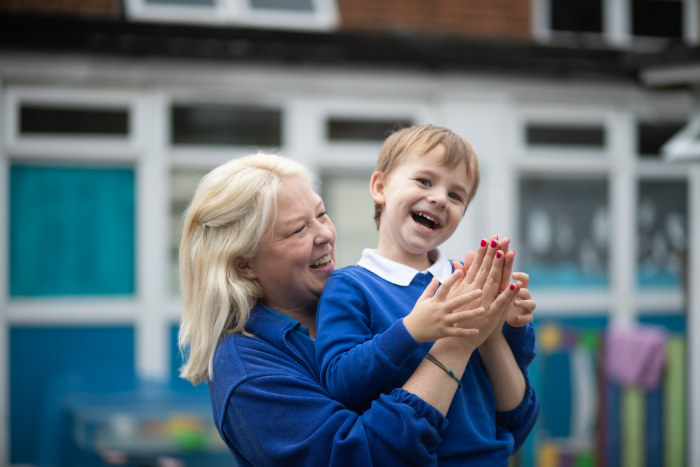
Enabling shared reading moments for parents and autistic children
Estimated reading time: 3 minutes, 30 seconds
Dr Rachel Walker, Head of Enfield Advisory Service for Autism, writes about her work as an education researcher, her doctoral thesis project and the publication of a journal article on building relationships with parents & enabling them to reflect on shared reading moments with their autistic children through reading activities.
Some may say I’m a perpetual student. I have always enjoyed learning and researching; this led me to doing a Masters degree in Teaching and Learning when I was first a primary school teacher. After five years working in mainstream, I moved to an autism specific special school.
This move sparked new interest in finding out more about ways to teach and work with autistic children. I wanted to understand their perspectives, their experiences and ways to engage them better so that hopefully they could enjoy being at school and I could help them learn and make progress.
After securing a position on the school leadership team at Russet House School, I applied to UCL Institute of Education to begin a Doctor in Education degree (EdD).
An EdD differs from a PhD in that it is a degree for education professionals rather than a degree for professional researchers. It helped me explore my work in school through the application of doctoral-level research skills to real-life issues that the school and I were grappling with.
At the time, the school was seeking ways to enhance the teaching of reading and to engage parents in supporting this by reading with their children at home. It soon became apparent that teachers in the school knew very little about the parents’ experiences of trying to read with their children and, similarly, parents knew little about how teachers taught reading skills, particularly to children who had significant learning difficulties, were non-speaking, and did not readily engage with activities that were not of their choosing. This was an ideal area for my doctoral thesis research. I set about designing a project to:
- explore parent experiences of home reading activities with their autistic children
- learn more about ways teachers engaged autistic children with learning difficulties and minimal verbal language to teach them reading skills
- enableshared understanding and exchange of strategies between parents and teachers so that they could work together in teaching children to read
The project had four phases: Exploration of views and experiences of parents and teachers through questionnaires and focus groups; training for teachers and parents on the teaching of reading skills to pre-readers and emerging readers; a 12 week Home-School Programme during which teachers and parents shared videos of reading activities with the children and kept diaries to record progress and challenges; semi-structured interviews with parents and teachers to review and evaluate the project.
Given the multiple phases of the project and the mixed research methods used, many data sets were gathered. These took many months to analyse and even longer to write up for my doctoral thesis!

Thankfully, all went well. I graduated some years ago now and have been very busy since. In 2018, I was appointed as the Head of Enfield Advisory Service for Autism (EASA), attached to the school, and have been developing EASA’s work as a Strategic Partner and Training Hub of the AET. My doctoral project work has always been in the forefront of my mind, informing my thinking and highlighting the importance of developing and nurturing strong home-school partnership for all our children.
In my work, I found that building trusting relationships between teachers and parents (in my case focused on reading) had manifold benefits: they both got to know the children better; how they could adapt practice and what worked best for the children in different contexts; and they had ways to problem-solve together when things were tricky.
With the continued support and encouragement of my supervisors, Professor Liz Pellicano and Dr Jon Swain, one part of my doctoral thesis work has now been published in a peer-reviewed journal. The article, “It’s about sharing a moment”, focusses on the views and experiences of the parents reading with their children at home prior to them beginning the 12-week Home School Programme (data gathered through questionnaires and focus groups).


